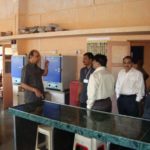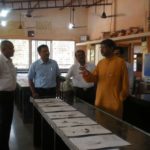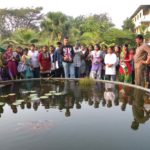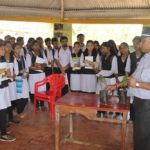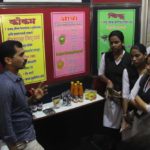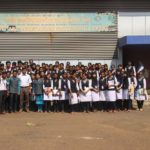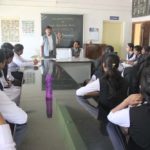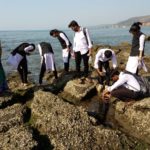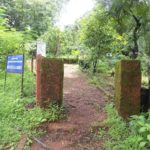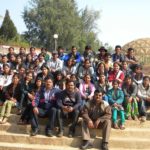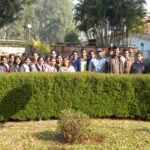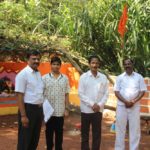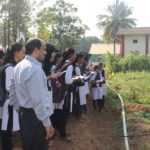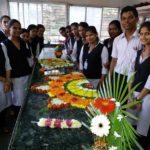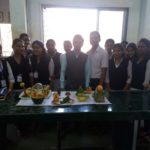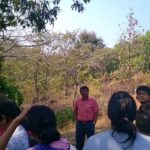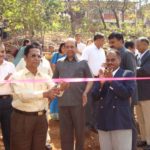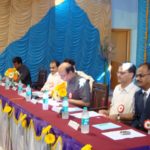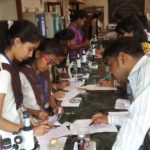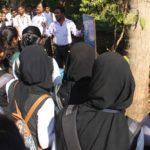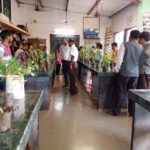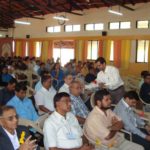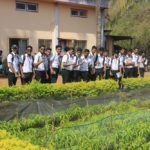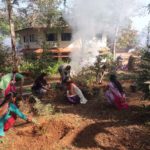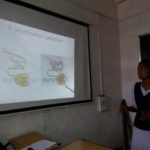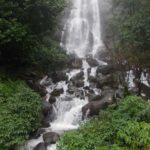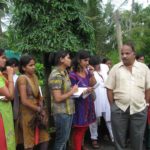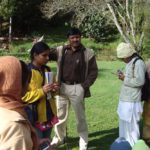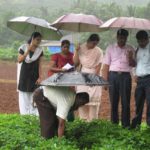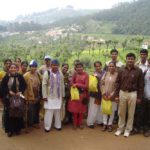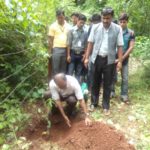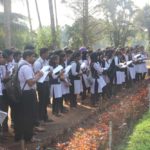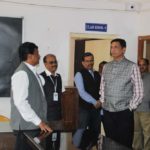About Department
The department is started in 1996 then started T.Y.B.Sc from 1999, MSc by research from 2008-09,M.Sc. in Taxonomy and Phytochemistry from 2009 and Ph. D. from 2007-08

Dr. Raghunath L. Ghalme
Associate Professor, (Head of the Department & Co-ordinator M.Sc.)
M.Sc., B.Ed., M.Phil., Ph.D.
Plant Physiology
Year of Joining 1997
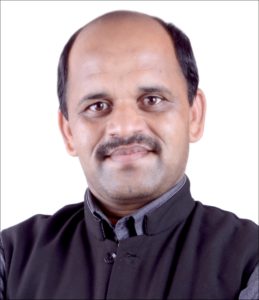
Dr. Vikram P. Masal
Associate Professor
M.Sc., B.Ed., M.Phil., Ph.D.
Cytogenetics
Year of Joining 2000

Prof. Ajinkya. V. Mulukh
Assistant Professor
M.Sc.
Angiosperms and Phytochemistry
Year of Joining 2014
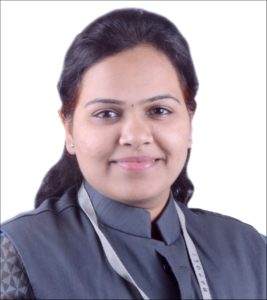
Prof. Ms. Shruti M. Awale
Assistant Professor
M.Sc.
Angiosperms and Phytochemistry
Year of Joining 2016

Prof. Mrs. Deepali Vishwas Nagvekar
Assistant Professor
M.Sc., SET
Angiosperms and Phytochemistry
Year of Joining 2018
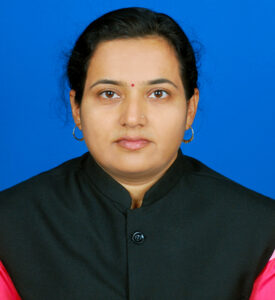
Prof. Mrs. Poonam Panaskar
Assistant Professor
Ph.D, M.Sc., SET
Year of Joining 2023

Prof. Mr. Niwas Desai
Assistant Professor
Ph.D, M.Sc., SET
Year of Joining 2023
Mr. Jadhav V. S.
Lab Assistant
B. Sc.
Botany
Year of Joining 2008
Mr. Sanas M. B.
Lab Attendant
SSC
Year of Joining 1996
Mr. Shinde S. C.
Lab Attendant
SSC
Year of Joining 2012
F.Y.B.Sc.
-
Semester
Course Course Code Weightage
Credit
Syllabus I
Plant Diversity 1 USBO101 100
2
Syllabus Form and Function 1 USBO102 100
2
Plant Diversity 1 USBOP1 50
1
Form and Function 1 USBOP2 50
1
II
Plant Diversity 1 USBO201 100
2
Form and Function 1 USBO202 100
2
Plant Diversity 1 USBOP1 50
1
Form and Function 1 USBOP2 50
1
S.Y.B.Sc.
-
III
Plant Diversity II USBO301 100
2
4.213-S.Y.B.Sc_.-Botany-SEM-III-PAPER-I Form and Function II USBO302 100
2
4.214-S.Y.B.Sc_.-Botany-SEM-III-PAPER-II Current trends in plant Sciences I USBO303 100
2
Plant Diversity II USBOP1 50
1
4.215-S.Y.B.Sc_.-Botany-SEM-III-PAPER-III Form and Function II USBOP2 50
1
Current trends in plant Sciences I USBOP3 50
1
IV
Plant Diversity II USBO401 100
2
Form and Function II USBO402 100
2
Current trends in plant Sciences I USBO403 100
2
Plant Diversity II USBOP1 50
1
Form and Function II USBOP2 50
1
Current trends in plant Sciences I USBOP3 50
1
T.Y.B.Sc.
-
V
PLANT DIVERSITY III USBO501 100
2.5
4.5 Syllabus for T.Y.B.Sc Botny Sem (V& VI) CBSGS PLANT DIVERSITY IV USBO502 100
2.5
FORM AND FUNCTION III USBO503 100
2.5
CURRENT TRENDS IN PLANT SCIENCESII USBO504 100
2.5
HORTICULTURE & GARDENING -I USACHO501 100
2
PLANT DIVERSITY III USBOP5 50
1.5
PLANT DIVERSITY IV 50
1.5
FORM AND FUNCTION III 50
1.5
CURRENT TRENDS IN PLANT SCIENCESII 50
1.5
HORTICULTURE & GARDENING -I USACHO5P1 100
2
VI
PLANT DIVERSITY III USBO601 100
2.5
PLANT DIVERSITY IV USBO602 100
2.5
FORM AND FUNCTION III USBO603 100
2.5
CURRENT TRENDS IN PLANT SCIENCES II USBO604 100
2.5
HORTICULTURE AND GARDENING –II USACHO601 100
2
TYBSc App Com Horticulture PLANT DIVERSITY III USBOP6 50
1.5
PLANT DIVERSITY IV 50
1.5
FORM AND FUNCTION III 50
1.5
CURRENT TRENDS IN PLANT SCIENCES II 50
1.5
HORTICULTURE AND GARDENING –II USACHO6P1 100
2
M.Sc.
-
I
Plant Diversity :CryptogamsI ( Algae and Fungi) PSBO101 100
4
MSc Bot Sem I and II Plant Diversity – Spermatophyta I (Gymnosperms and Angiosperms)
PSBO102 100
4
Plant Physiology PSBO103 100
4
Cytogenetics, Molecular Biology and Biotechnology
PSBO104 100
4
Plant Diversity :CryptogamsI ( Algae and Fungi) PSBOP101 50
2
Plant Diversity – Spermatophyta I (Gymnosperms and Angiosperms)
PSBOP102 50
2
Plant Physiology PSBOP103 50
2
Cytogenetics, Molecular Biology and Biotechnology
PSBOP104 50
2
II
Plant Diversity : Cryptogams II (Bryophyta and Pteridophyta)
PSBO201 100
4
Plant Diversity: Spermatophyta II (Anatomy, Developmental Botany and Palynology)
PSBO202 100
4
Plant Physiology and Environmental Botany
PSBO203 100
4
Medicinal Botany and Dietetics PSBO204 100
4
Plant Diversity : Cryptogams II (Bryophyta and Pteridophyta)
PSBOP201 50
2
Plant Diversity: Spermatophyta II (Anatomy, Developmental Botany and Palynology)
PSBOP202 50
2
Plant Physiology and Environmental Botany
PSBOP203 50
2
Medicinal Botany and Dietetics PSBOP204 50
2
III
Techniques and Instrumentation PSBO301 100
4
Molecular Biology PSBO302 100
4
Angiosperms and Phytochemistry I PSBO303 100
4
Angiosperms and Phytochemistry II PSBO304 100
4
Techniques and Instrumentation PSBOP301 50
2
Molecular Biology PSBOP302 50
2
Angiosperms I PSBOP303 50
2
Project PSBOP304 50
2
IV
TECHNIQUES AND INSTRUMENTATION PSBO401 100
4
Molecular Biology PSBO402 100
4
Angiosperms and Phytochemistry III PSBO403 100
4
Angiosperms and Phytochemistry IV PSBO404 100
4
TECHNIQUES AND INSTRUMENTATION PSBOP401 50
2
Molecular Biology PSBOP402 50
2
Angiosperms and Phytochemistry III PSBOP403 50
2
Project PSBOP404 50
2
Programme Outcome-B.Sc.
PO1. CRITICALTHINKING
The curriculum is designed in such way that students should acquire an ability to observe accurately and objectively. They should be able to solve the problems and also think scientifically, independently and draw rational conclusions.
PO2. SCIENCE COMMUNICATION
Curriculum empowers communication skills in science which further enhances easy spread of scientific knowledge in the society.
PO3 SOCIAL INTERACTIONS
Students acquire national integration, community harmony, gender equality and nationalism which inculcate harmonized social interaction. Made aware of environment related issues.
PO4 EFFECTIVE CITIZENSHIP
Students acquire attributes of good citizens with certain ethics, made aware of environmental issues its management and planning.
PO5 ALLROUND PERSONALITY
Students develop as all-round individuals possessing variety of values and skills conferred by extracurricular activities.
M.Sc.
PO1. CRITICALTHINKING
The curriculum is designed in such way that students should acquire an ability to observe accurately and objectively. They should be able to solve the problems and also think scientifically, independently and draw rational conclusions.
PO2. SCIENCE COMMUNICATION
Curriculum empowers communication skills in science which further enhances easy spread of scientific knowledge in the society.
PO3 SOCIAL INTERACTIONS
Students acquire national integration, community harmony, gender equality and nationalism which inculcate harmonized social interaction.
PO4 EFFECTIVE CITIZENSHIP
Students acquire attributes of good citizens with certain ethics, made aware of environmental issues its management and planning.
PO5 ALLROUND PERSONALITY
Students develop as all-round individuals possessing variety of values and skills conferred by extracurricular activities.
PO6
Integration of convergent and divergent thinking ability, which makes the students to differentiate between myth and realities and enable to develop new solutions for problems
PO7
Students acquaint with research attitude and able to find out research problems. They understand global, environmental and ethical issues by interdisciplinary kind of research
PO8
Students instill baseline thinking required for employment and entrepreneurship.
PO9
Students acquire skills in handling scientific instruments, planning and performing scientific experiments.
PhD
PO1
Student gets ability of critical thinking and develops competence required in the field of research
PO2
Develop skill of scientific communication.
PO3
Understand the ethical aspects of research.
PO4
Students can understand scientific research methodology
PO5
They develop soft skills required to perform, write and present research topics for the research degree
PO6
Develops quality such as critical thinking and analysis
PO7
Students get ability to find out the research problem, their solutions and conclude the results in both fundamental and applied science
PSO-B.Sc.
PSO1.To provides thorough knowledge about various plant groups from primitive to highly evolved.
PSO2.To creates awareness in students about applications of different plants in various industries.
PSO3.To highlights the potential of these studies to become an enterpruner.
PSO4. To enrich the students with skills related to laboratory as well as field based studies
PSO5. To make the students aware about conservation and sustainable use of plants
PSO6. To create foundation for further studies in Botany
PSO7. To address the socio-economical challenges and remedies related to plant sciences
PSO8. To enrich students for taking up and shaping a successful career in Botany
M.Sc.
PSO1: To build up the Department on modern lines for education and training levels.
PSO2: To impart basic and practical knowledge and scientific skills in the concerned field.
PSO3: To train the students for Integration of multidimensional field.
PSO4: Anticipation of new teaching/researchable areas.
Ph.D.
PSO1: It implies exercising imagination and constantly seeking out originality. It comes from developing a sense of curiosity and courage to questions the status-quo.
PSO2: It aims at exploring and following methods of doing things is a different way for betterment and improvement in solutions to problems. It involves questioning pre-conceived ideas, discovering and / or making something not already there.
PSO3: Indeed, it is a divine attribute; but human beings are also gifted to be creative
Course Outcomes
SEMESTER-I
Course: S.BOT.1.01 PLANT DIVERSITY-I
Course Outcomes:-
The students will be able to-
- Understand the morphology, structure and importance of the organisms.
- State the meaning of scientific terms.
- Differentiate between various groups of Bacteria, Algae, Fungi, Lichens and Bryophyte.
SEMESTER-I Course: S.BOT.1.02 ANGIOSPERMS-I
Course Outcomes:-
The students will be able to-
- Understand the morphology, Structure and functions of various parts of plants.
- Learn the taxonomical terminology and understand the meaning of the same.
- Learn anatomical structure and functions of various tissues.
SEMESTER-II Course: S.BOT. 2.01 PLANT PHYSIOLOGY AND BIOCHEMISTRY-I Course Outcomes:-
The students will be able to understand-
- The transport mechanism in plants and differentiate between the physiological processes and their importance.
- The mechanism of enzyme actions.
- The major classes of organic compounds, their synthesis and breakdown in plants.
SEMESTER-II Course: S.BOT.2.02 CYTOLOGY, GENETICS & ECOLOGY LEARNING Course Outcomes:-
The students will be able to understand-
- The structure and functions of various cell organelles.
- The phenomenon of inheritance.
- The interactions taking place in the ecosystem and flow of Energy.
S.Y.B.Sc.
SEMESTER-III Course: USBO301- PLANT DIVERSITY-II
Course Outcomes:-
The students will be able to-
- Understand the importance of bacteria and methods of their cultivation.
- Learn about the causal organisms of plant diseases.
- Learn the life cycles of the individuals belonging to Algae, Fungi and Lichens
SEMESTER-III Course: USBO302- Form and Function-II
Course Outcomes:-
The students will be able to understand-
- The importance of minerals to plants,
- The catabolic process and synthesis of chemical energy in plants,
the anabolic process in plants.
- And differentiate between light and dark reactions of photosynthesis.
- The respiratory process in presence of light and differentiate between C3, C4 and
CAM plants
SEMESTER-III Course: USBO303-ANATOMY, EMBRYOLOGY
& PALYNOLOGY
Course Outcomes:-
The students will be able to-
- Differentiate between the normal and anomalous secondary growth.
- Learn about the different meristems their locations and functions.
- Learn the developmental stages of micro and megasporangium.
- Understand the pollen morphology and the applications of palynology.
SEMESTER-IV Course: S.BOT.4.01 PLANT DIVERSITY-III
Course Outcomes:-
The students will learn-
- The life cycles of the individuals belonging to Bryophyta, Pteridophyta and
Gymnosperms.
- The geological time periods and the plants of past.
- The different methods of fossilization.
SEMESTER-IVCourse: S.BOT.4.02 ANGIOSPERMS-II
Course Outcomes:-
:The students will learn-
- The taxonomical terminology and understand the
meaning of the same.
- The various classification systems and understand the reasoning behind the same.
- Basics of Nomenclature
.
SEMESTER-IVCourse: S.BOT.4.03 MEDICINAL BOTANY AND TOOLS OF ANALYSIS
Course Outcomes:-
The students will learn-
- The methods of evaluation of crude drugs and the adulterants used.
- The working and use of instruments in plant science.
- The important websites and databases availableon the internet.
- To compare the significant difference/s in 2 or more samples.
T.Y.B.Sc.
SEMESTER-V
Course: USBO501 CYTOGENETICS, MOLECULAR BIOLOGY &BIOTECHNOLOGY Course Outcomes:-
The students will be able to understand-
- The mechanism, role and importance of cell division, linkage and crossing over.
- The various gene mutations, their adverse affects in man and advantages in plant breeding.
SEMESTER-V Course: USBO502 ANGIOSPERMS-III
Course Outcomes:-
The students will be able to understand-
- Taxonomic Terminology.
- Various classification systems and the reasoning behind the same.
- Learn various plant families and their economic importance
SEMESTER-VI Course: S.BOT.6.01
PLANT PHYSIOLOGY ANDBIOCHEMISTRY-III
Course Outcomes:-
The students will be able to understand-
- The biochemical steps involved in nitrogen assimilation in plants and will be able to
differentiate between the process of inorganic and organic nitrogen fixation.
- The phenomenon of transformation of vegetative axis into reproductive axis and the substances responsible for this transformation.
- The process of seed germination and know the factors which facilitate the germination and the physiology of fruit ripening.
- The time measuring mechanism in plants.
- The ageing process in plants.
SEMESTER-VI Course: S.BOT.6.02 ECOLOGY AND ENVIRONM ENTAL BOTANY-I
Course Outcomes:-
The students will be able to understand-
- The role and importance of biotic and abiotic environmental factors in the sustenance of plant life.
- Causes, consequences, prevention, remediation of pollution and efforts taken in reducing or controlling the pollution causing factor.
- The importance of phytogeography and forestry for man and the legal enforcements imposed by government in preventing the loss to the natural regional flora.
MSC
Course: MS.BOT.1.01PLANT DIVERSITY-IV
(ALGAE AND FUNGI)
Course Outcomes:-
The students will be able to understand-
- The morphology, structure and importance of the organisms.
- Classification and interrelationships between various groups and reasons behind the same.
- Applications of algae and fungi in different fields.
Course: MS.BOT.1.02 PLANT DIVERSITY-V
(GYMNOSPERMS AND ANGIOSPERMS)
Course Outcomes:-
The students will be able to understand-
- Classification and interrelationships between order of gymnosperms.
- Various classification systems of angiosperms and the basis of their classification.
- Evolution and study of various taxonomic characters.
- The distinguishing characters of plants belonging to different families and the economic importance of these families.
Course: MS.BOT.1.03 PLANT PHYSIOLOGY AND BIOCHEMISTRY-IV
Course Outcomes:-
The students will be able to understand
- The mechanism of enzyme actions, kinetics and inhibition.
- Structure and organization of photosynthetic apparatus and mechanism of electron transport and synthesis of ATP.
- Repair and regulatory mechanism governing the photosynthetic machinery and various pathways.
- Assimilation of nutrients in plants.
Course: MS.BOT.1.04 MOLECULAR BIOLOGY
Course Outcomes:-
The students will be able to understand-
- The genetic regulation in cells of living organism.
- How the higher plant organism change over time and what are the molecular mechanisms underlying these changes.
- Identify the basic methods and approaches used in molecular biology.
- Explain the role played by the molecular components of the genetic machinery.
Course: MS.BOT.2.01 PLANT DIVERSITY-VI
(BRYOPHYTES AND PTERIDOPHYTES)
Course Outcomes:-
The students will be able to understand-
- The range of structural variation in bryophytes and pteridophytes.
- The classification (as per G. M. Smith) of bryophytes and pteridophytes up to orders.
- The significance of bryophytes as pioneer plants on land and their role in the origin of pteridophytes.
- The role of pteridophytes in the origin of seed plants.
- The economic importance of pteridophytes
.
Course: MS.BOT.2.02
ANATOMY, DEVELOPMENTAL BOTANY &PALYNOLOGY
Course Outcomes:-
The students will be able to-
- Differentiate between the different meristems, learn about their locations and functions, and their division according to different theories.
- Learn the mechanism of interaction of pollen and pistil during pollen germination and their role in applied biology.
- Understand the relationships and interactions of pollen during their formation and in tetrad conditions.
- Learn the different pollen proteins, their properties and their role as allergens.
Course: MS.BOT.2.03
ECOLOGY AND ENVIRONMENTAL BOTANY-II
Course Outcomes:-
The students will be able to understand-
- Use of various microbes and plants that can help to prevent pollution and clean up polluted environment.
- The demands of a given species from its environment at each stage of its life cycle.
- The reaction of a species to the changes in its environment.
- Various characteristics that is unique to the population as a whole and not to an individual in the group.
- The theories explaining population growth and the analytical and synthetic characters used to express the characteristics of a community.
Course: MS.BOT.2.04MEDICINAL BOTANY
Course Outcomes:-
The students will be able to understand-
- The plant sources with medicinal properties and their distribution.
- The use of various macroscopical, microscopical and
chemical evaluation parameters for authentication of crude drugs and detection of adulterants.
- The various groups of phytochemicals and their medicinal uses.
- Importance of nutraceutical as dietary supplements.
- The various biological properties of plants and estimation of their potency in various diseases.
Course: MS.BOT.3.01 BIOSTATISTICS, BIOINFORMATICS & NANOTECHNOLOGY
Course Outcomes:-
On completion of the course, the student shall be able to-
- Understand the basic concepts of statistics and apply them.
- Use open source computer programs like PSPP for statistical analysis of sampled data.
- Use the internet to conduct Bioinformatic Database searches.
- Develop the skills necessary for writing scientific works.
Course: MS.BOT.3.02PLANT PATHOLOGY
Course Outcomes:-
- The students willbe able to-
- Distinguish the various symptoms of plant diseases and understand host pathogen relationship.
- Analyze the preventive and control measures and the defense strategies used by plant host.
- Learn the method of studying plant diseases and recognize the factors responsible for causing the plant diseases.
- Understand the whole process of disease cycle in some economically important plants.
Course: MS.BOT.3.04 Angiosperms-IV
Course Outcomes:-
The students will be able to-
- Strengthen the fundamentals learnt in under graduate program and
will learn new approaches for application of botanical knowledge in human welfare.
- Apply technological tools in unraveling the mystery of evolution, understand phylogeny, identification and understand diversity, using the knowledge in biodiversity, bioprospecting, green belt planning, and IPR.
Course: MS.BOT.4.01TECHNIQUES AND INSTRUMENTATION
Course Outcomes:-
The students will be able to-
- Understand the basic concepts of microscopy, centrifugation, chromatography and tracer techniques.
- Understand the applications of techniques mentioned above in biology
Course: MS.BOT.4.02ANGIOSPERM-V
Course Outcomes:-
The students will be able to-
- Learn the diversity, present status and interrelationships among different families apart from their characteristic features and economic importance.
- Know the importance of different anatomical, embryological and palynological features.
- To understand the use of IPR, patents, copyrights in protecting our traditional knowledge.
Course: MS.BOT.4.03ANGIOSPERMS-VI
Course Outcomes:-
The students will be able to-
- To understand the importance and application of numerical taxonomy, various taxonomic databases and the usefulness of internet in taxonomic studies.
- To understand the use of libraries, literature, herbarium and botanical gardens for taxonomic studies.
Course: MS.BOT.4.04 ANGIOSPERMS-VII
Course Outcomes:-
:The students will be able to-
Learn theapplication of technological tools used inunravelling the mystery of evolution, phylogeny, identification and diversity, using the knowledge in plantgeography and ethnobotany along with Taxonomy of angiosperms
Infrastructure
Well-equipped laboratories with total area: 1163 sq. ft. (U.G.) and 643 sq. ft. (P.G. and Research)
Botanical Garden, live taxonomic tool having about 1.0-Acre area.
- of Plant Species: 364
- Rare, Endangered and Threatened Plant species: 25
- Endemic Plant species: 30
Research facilities:
Botany lab is recognized as Research lab by University of Mumbai.
Laboratories-High End Instruments, Special facilities
Well equipped, separate laboratories for UG, PG & PhD student.
Spectrophotometer, Laminar air flow, Stereomicroscope, LCD projector, U. V. Trans illuminator, High speed centrifuge Machine, Digital electronic balance, Autoclave, Microscope with Digital Camera, Gel Electrophoresis Kits, Shaker, Colorimeter etc.
Staff Room: 200sq. ft. Well ventilated and specious staff room is available for Staff
Store Rooms: 177.16 sq. ft.
UGC, University or any other research project, student projects
Research projects completed by faculty:
| Name of Faculty | Year | Funding agency | Title of Project | Amount Sanctioned | Present Status |
| Dr. S. P. Jagdale | 2009-11 | UGC | Pharmacognostical and pharmacological evaluation of Terminalia for its aphrodisiac potential | 1,20,000/ | Completed |
| 2014-15 | UGC | Evaluation of aphrodisiac potential of Eluphianuda Lindle | 60,000/- | Completed | |
| Dr. R. L. Ghalme | 2010-11 | University of Mumbai | Ethno- Medico- Botanical survey of Sacred Groves of Mugiz, Tal Dapoli, Dist Ratnagiri | 7,000/- | Completed |
| 2012-13 | University of Mumbai | ‘Phyto-sociological studies of Wanzaloli sacred grove of Dapoli Tahsil, District Ratnagiri (M.S.)’. | 26000/- | Completed | |
| 2015-16 | University of Mumbai | “Studies on floristic diversity of fresh water marshy places of Dapoli tehsil of Ratnagiri district (M.S.).” | 25000/- | Completed | |
| 19-20 | University of Mumbai | ‘Studies on vascular wall flora of Dapoli Tehsil of Ratnagiri District (M.S.)’ | 35000/- | Completed
(2022-23) |
|
| Dr. V. P. Masal | 2012-13 | University of Mumbai | ‘Ethnomedicinal and phytochemical studies of Drynariaquercifolia L. from Ratnagiri and Sindhudurg district of Maharashtra’ | 26000/- | Completed |
| 2015-16 | University of Mumbai | Exploration of Ethnomedicinal and Phytochemical constituents of Acrostichumaureum L. from Ratnagiri District of Maharashtra”. | 25000/- | Completed | |
| 2019-20 | University of Mumbai | Estimation of phytoconstituents from Athyrium species from Ratnagiri Districts’ | 30000/- | Completed
(2022-23) |
|
| Mr. S. S. Sakhalkar | 2012-13 | University of Mumbai | Screening and identificationof polymer and vegetable oil degrading fungi from natural habitat’. | 25000/- | Completed |
| 2013-14 to 2014-15 | UGC | “Studies on isolation of plastic degradingFungi and Novel Ecofriendly Bioremediations of Polymeric waste” | 1,50,000/- | Completed | |
Projects completed by UG and PG students:
| Year | Number of projects completed | |
| TYBSc | MSc | |
| 2004-05 to 2011-12 | 70 | 08 |
| 2012-13 to 2016-17 | 57 | 30 |
| 2017-18 to 2021-22 | 68 | 27 |
| 2022-23 to 2023-24 | 19 | 09 |
- KavadeShrinath, Vice-President, Society for Environment and Biodiversity Conservation Ratnagiri
- Dr. SarafAparna,Institute of Science, Mumbai
- Dr. Rajendra Shinde, St. Xavier College, Mumbai
- Bhavan’s College, Mumbai
- Sangeeta Godbole, Jai Hind College, Churchgate, Mumbai
- Devangi Chacchad, Jai Hind College, Churchgate, Mumbai
- PratapNaikwade, A, C, S College Devrukh, Dist-Ratnagiri.
- Dr. VinodShimple, The New college Kolhapur
| CLASS | Academic year | TOTAL STRENGTH | RESULT (%) | ANALYSIS | ||||||
| O | A | B | C | D | E | F | ||||
| T.Y.B.Sc. | 2012-13 | 05 | 60 | 01 | 00 | 01 | 01 | 00 | 00 | 00 |
| 2013-14 | 07 | 85.71 | 00 | 02 | 04 | 00 | 00 | 00 | 01 | |
| 2014-15 | 13 | 66.66 | 00 | 01 | 05 | 02 | 00 | 00 | 05 | |
| 2015-16 | 16 | 68.75 | 02 | 04 | 04 | 01 | 00 | 00 | 05 | |
| 2016-17 | 16 | 93.75 | 01 | 09 | 04 | 01 | 00 | 00 | 01 | |
| 2017-18 | 21 | 100 | 08 | 10 | 03 | 00 | 00 | 00 | 00 | |
| 2018-19 | 13 | 92.10 | 00 | 03 | 09 | 00 | 00 | 00 | 01 | |
| 2019-20 | 16 | 100 | 16 | 00 | 00 | 00 | 00 | 00 | 00 | |
| 2020-21 | 07 | 100 | 04 | 03 | 00 | 00 | 00 | 00 | 00 | |
| 2021-22 | 16 | 93.75 | 04 | 08 | 03 | 00 | 00 | 00 | 01 | |
| 2022-23 | 12 | 80 | 01 | 05 | 02 | 00 | 00 | 00 | 02+02* | |
| M. Sc. II | 2012-13 | 03 | 100 | 01 | 01 | 01 | 00 | 00 | 00 | 00 |
| 2013-14 | 06 | 100 | 00 | 02 | 03 | 01 | 00 | 00 | 00 | |
| 2014-15 | 07 | 71.42 | 01 | 02 | 02 | 00 | 00 | 02 | ||
| 2015-16 | 08 | 62.5 | 00 | 04 | 01 | 00 | 00 | 00 | 03 | |
| 2016-17 | 06 | 83.33 | 01 | 02 | 01 | 01 | 00 | 00 | 01 | |
| 2017-18 | 07 | 100 | 01 | 06 | 00 | 00 | 00 | 00 | 00 | |
| 2018-19 | 09 | 100 | 00 | 09 | 00 | 00 | 00 | 00 | 00 | |
| 2019-20 | 06 | 100 | 06 | 00 | 00 | 00 | 00 | 00 | 00 | |
| 2020-21 | 05 | 100 | 04 | 01 | 00 | 00 | 00 | 00 | 00 | |
| 2021-22 | 03 | 100 | 00 | 03 | 00 | 00 | 00 | 00 | 00 | |
| 2022-23 | 02 | 50 | 00 | 01 | 00 | 00 | 00 | 00 | 01 | |
- AparnaPatil, MSc-I student was awarded with Silver Medal by University of Mumbai for Avishkar research Paper presentation competition held on 4th Jan.2014. The project was selected for State level Competition.
- V. P. Masal completed Ph. D. on 11th Nov. 2011.
- R. L. Ghalme completed Ph. D. on 13th July 2013.
- S. S. Sakhalkar has discovered, “A Process for the Biodegradation of PVC by Mycoflora” has filed for Petent with application No.778/MUM/2014) and was published by IPR Patent office, Govt. of India on 28 March 2014.
- Sakhalkar S. S. completed Ph. D. in 2015-16.
- Ghalme R. L. has recognized as Ph. D guide in Botany by University of Mumbai from 16th December, 2015.
- V. P. Masal has recognized as Ph. D guide in Botany by University of Mumbai from 7th May 2015
- A.V. Mulukh Passed PET exam.On 3rd Jan 2016 conducted by University of Mumbai.
- Diwan Deepali Anukul, MSc-II students Presented research project entitled ‘Antioxidant properties of aqueous extract of Solanumindicum L. and N. odorum L.’ in the Avishkar research Convention 2015-16 held at C. K. Thaur college Panvel on 21 st December 2015. The project was selected for University level roundorganized by SIES College Sion, Mumbai on 23rd Dec. 2015.
- Diwan Deepali Anukul, MSc-II students Presented research paper entitled’ Assessment of Reducing power assay and total phenolic content of Neriumadrom L.’ in National seminar organized by DUBSS college Dapoli on 5th& 6th February 2016. She secured 3rd rank in oral presentation.
- SalviSheetalShashikant of TYBSc student passed with 90.25% marks.
- Consistent high results of M.Sc. in University Examinations.
- Barve Sameer, a student of TYB.Sc presented research paper “ Bioplastic from agricultural waste of Banana rhizome” in Ratnagiri district Inter collegiate Avishkar convention held at ASP college Devrukh on 8th Dec.2017 and his project was selected for University level Avishkar competitions held at KEL college Kalomboli on 20th Dec. 2017.
- 3 Research project (5 students) participated in zonal round held at D B J Chiplun on 12 Dec. 2018. Out of which 2 projects were selected for University level. JuiliPawar and AnjarlekarGurangi G. of MSc-II students presented research papers
- 3 Research project (4 students) participated in zonal 14th Intercollegiate Avishkar Research Convention 2019-20 round held at Dr. TatyasahebNatu College Margtamhane, Dist. Ratnagiri21st Dec. 2019. Out of which 2 projects were selected for University level. Manali Desai and Arundhati Rane. of MSc-II students presented research papers
- DipaliNagvekar Qualified PET for subject Botany of Mumbai University on 16th April 2021.
- AjinkyaMulukhQualified PET for subject Botany of Mumbai University on 16th April 2021
- DipaliNagvekar Qualified SET examination on 5th Jan 2022.
- DipaliNagvekar Registered for PhD degree University of Mumbai under the guidance of Dr. Vikram P Masal with the topic name “Studies on Physiological responses of Cowpea (Vignaunguiculata (L.) Walp) Cv. Konkan Safed to Salinity Stress on 2nd July 2021.
- Shruti Awale qualified PET examination of Mumbai University on 5 Jan 2022.
- Arundhati Rane qualified PET examination of Mumbai University on 5 Jan 2022.
- NajlaDildarKondvilkar qualified Ph.D entrance test (PET) Mumbai University on 26th August 2022
- MehjabeenDawoodBangi qualified Ph.D entrance test (PET) Mumbai University on 26th August 2022
- MsAyshaInayatKhot (F. YB.Sc), Ms. Khadija LiyakatRakhange (F.Y B.Sc), Ms. SadafIliyasGothekar (F.Y B.Sc), Ms. SimranRiyazNandgaonkar (F.Y B.Sc) participated in 17th Aavishkar Inter-collegiate/Institute/Department Research Convention (Zonal Round) 2022-23 held at Arts, Commerce and Science College LanjaDist- Ratnagiri with topic “Spectrometric analysis of Chlorophyll pigments from Roadside” Category –Pure Science (UG) on 19th December 2022. This project was selected for University level (Final Round)
- Ku. AparnaPatil, MSc-I student was awarded with Silver Medal by University of Mumbai for Avishkar research Paper presentation competition held on 4th Jan.2014. The project was selected for State level Competition.
- Dr. V. P. Masal completed Ph. D. on 11th Nov. 2011.
- Dr. R. L. Ghalme completed Ph. D. on 13th July 2013.
- Prof. S. S. Sakhalkar has discovered, “A Process for the Biodegradation of PVC by Mycoflora” has filed for Petent with application No.778/MUM/2014) and was published by IPR Patent office, Govt. of India on 28 March 2014.
- Dr. Sakhalkar S. S. completed Ph. D. in 2015-16.
- Dr. Ghalme R. L. has recognized as Ph. D guide in Botany by University of Mumbai from 16th December, 2015.
- Dr. V. P. Masal has recognized as Ph. D guide in Botany by University of Mumbai from 7th May 2015
- Prof. A.V. Mulukh Passed PET exam.On 3rd Jan 2016 conducted by University of Mumbai.
- Mrs. Diwan Deepali Anukul, MSc-II students Presented research project entitled ‘Antioxidant properties of Aqueous extract of Solanumindicum L. and N. odorum L.’ in the Avishkar research Convention 2015-16 held at C. K. Thaur college Panvel on 21 st December 2015. The project was selected for University level roundorganized by SIES College Sion, Mumbai on 23rd Dec. 2015.
- Mrs. Diwan Deepali Anukul, MSc-II students Presented research paper entitled’ Assessment of Reducing power assay and total phenolic content of Nerium adrom L.’ in National seminar organized by DUBSS college Dapoli on 5th& 6th February 2016. She secured 3rd rank in oral presentation.
- Mrs. Salvi Sheetal Shashikant of TYBSc student passed with 90.25% marks.
Consistent high results of M.Sc. in University Examinations. - Barve Sameer, a student of TYB.Sc presented research paper “ Bioplastic from agricultural waste of Banana rhizome” in Ratnagiri district Inter collegiate Avishkar convention held at ASP college Devrukh on 8th Dec.2017 and his project was selected for University level Avishkar competitions held at KEL college Kalomboli on 20th Dec. 2017.
- To increase the research activities
- Enrich the Botanical Garden with endemic and RET plants
i. Departmental Library
Abstract Books: 18
Thesis: 06
MSc project reports: 19
Total No. of text books: 38
Total Practical books: 27
Total No. of Reference books: 99
Journal (Plant Physiology) Copies: 35
E-books and e-journals are available to the students and staff-20.
The list of books is attached separately.
ii. Extension/Consultancy
Free consultancy
Consultancy to farmers
Field experts to various college excursions
Identification of local plants species.
‘Yoga’ Instructor
E-Article: “Eureka E-info-letter” published every month on College website
iii. Linkages/MoU:
Informal Academic collaboration with local Agricultural University
iv. Placement: Informal
Dr. R. L. Ghalme
- Elected member of BOS in Botany of Mumbai University on 9th 2018.
- C. nominated BOS member in subject Botany of University of Mumbai from 2023-24.
- BOS member in subject Botany of autonomous college Sathe College Mumbai and ASP college, Devrukh, Dist. Ratnagiri.
- Subject expert in Botany in the interview panels of Mumbai University for appointment of Associate Professors.
- Member of LIC of Mumbai University
- Judge for P.G. &Ph D. Projects in Avishkar – a research Convention 2015-16 at C.K.T. College Panvel on 21st Dec. 2015.
- Member of Research and Innovation Committee of Konkan founded by Hon. Joint Director, Panvel region from 2019-20.
Dr. V. P. Masal
- Subject expert in Botany in the interview panels of Mumbai University for appointment and CAS.
- Member of syllabus Framing Committee, University of Mumbai -M. Sc. II Botany from 2017.
- Working as examiner/ Paper setter for T. Y. B. Sc. and M. Sc. I and II theory and Practical Examinations at University level.
- Resource person in DES INSPIRE programme at DUBSS College, Dapoli.
Dr. N. M. Desai
- Member of syllabus Framing Committee, University of Mumbai -NEP F.Y. B.Sc. Botany from 2024.
- Subject Expert in One day workshop for M.Sc. I Botany Revised Syllabus NEP 2020 at R D and S H National College, Bandra Mumbai.
- Working as examiner/ Paper setter for T. Y. B. Sc and M. Sc. I theory and Practical Examinations at University level.
Dr. P. S. Panaskar
- Member of syllabus Framing Committee, University of Mumbai -NEP F.Y. B.Sc. Botany from 2024.
- Working as examiner for T. Y. B. Sc. theory and Practical Examinations at University level.
Dr. D. V. Nagvekar
- Working as examiner for T. Y. B. Sc. theory and Practical Examinations at University level.
Dr. A. V. Muluk
- Working as examiner for T. Y. B. Sc. theory and Practical Examinations at University level.
V. Study tours at different places :
The department is organizing study tours every year to different places having botanical interest. Rocky Beaches, Dr. B.S.K.K.V. Dapoli, Mahabaleshwar, Shivaji University Kolhapur, Goa University, Different sacred groves of Dapoli, MangalUdyog Kendra, Kaju factory, etc.
vi. Extra Lectures
The faculty is organizing extra lectures on Sunday, holidays and according to extra lectures shown in the time table, if needed.
vii. Class tests/tutorials:
Class tests are conducted according to University of Mumbai as well as the more Unit tests are taken on some units, papers are assessed and immediately discussed with students.
viii. Home assignments:
On some units the home assignments are given and papers are assessed immediately and given to the students.
ix. Remedial lectures:
At the end of every semester the department is organizing Remedial lectures for all students as well as for educationally weak students.
x. Bridge lectures:
At the beginning of every year bridge lectures are organized to fill the knowledge gaps
xi. Mentor Mentee: 2023-24
| Name of Guardian Teacher | No. of students |
| Dr. RaghunathL.Ghalme | 10 |
| Dr. Vikram P. Masal | 10 |
| Mr. Mulukh A. V. | 14 |
| Mrs. Awale S. M. | 11 |
xii.Workshops/seminars/Conferences/Activities organized:
- Field oriented workshop in association with BOS, on ‘Environmental Botany’ 2004
- One day workshop on “Solid Waste Management” for students.(2008)
- Organized National Conference on ‘Herbal & Traditional medicines’ 6 & 7 Feb.2009: Inaugurated by Hon. Dr. ArunNigvekar (Ex-Chairman, U.G.C.)
Delegates: 182 and Abstracts: 89 - Organized National Webinar on, ‘Mangrove diversity of Maharashtra’ on 2 June 2020, Organized by Department of Botany and IQAC of Dapoli Education Society’s Dapoli Urban Bank Senior Science College, Dapoli- Ratnagiri (Maharashtra). The Speaker was Dr. Suchendra Dutta Mumbai. Total more than 334 participants from12 states participated.
- Organized National Webinar On“Biodiversity and Community Involvement in itsConservation” on 24/07/2020 Organized by Department of Botany and IQAC of Dapoli Education Society’s Dapoli Urban Bank Senior Science College, Dapoli- Ratnagiri (Maharashtra). The Speaker was Dr. ShrinathKavade, Pune. Hon. Founder member and Vice President “Trees for the Future India’. Total more than 217 participants from 9 states were actively participated.
- Organized National Webinar On “Wetlands for our Future” on 02/02/2021 on the occasion of World Wetland Day Organized by Department of Botany and IQAC Dapoli Urban Bank Senior Science College, Dapoli- Ratnagiri. The Speaker was Dr. Mahesh Shindhikar, COEP, and Pune. Total more than 118 participants from 4 States were participated.
- Organized National Webinar on “Glances of Biodiversityof Western Ghats” on 17th July 2021 at 11.00am to 12.00 noon. The Speaker was Dr. V. B. Shimpale, Taxonomist, Dept. of Botany New College Kolhapur. Total 149 participants from 5 different States were participated.
- Organized National conference on Recent Trends in Life Science, Energy and Environment by Life Science depts. on 24th and 25th 2021. Total 59Abstract of research papers were received and more than 100 participants from different States from our country were actively participated.
- Quiz competition for students on occasion of ‘Earth day’ 22April 2021
- Organized DES-Inspire programme for 11th students of Dapoli and other colleges from 21th to 23rd Jan 2021.
- Organized One day online workshop on revised syllabus of MSc part-I in association with BOS in subject Botany, University of Mumbai on 7th August 2021
- Organized National Webinar On “Glances of Biodiversity of Western Ghats” on 17th July 2021, organized by Department of Botany and IQAC Dapoli Urban Bank Senior Science College, Dapoli- Ratnagiri. The Speaker was Dr. VinodShimple.
- Organized National Webinar On “Spirulina” on 14th August 2021 and the Speaker was Vikrant Kulkarni.
- Organized Two days Online National Conference on, ‘Recent trends in Life Science, Energy and Environment’ on 24th& 25th September2021
- Organized National Webinar On “The importance of Wetland ecosystems’ on occasion of World Wetland day on 2nd February 2022. The Speaker was Dr. RajendraLavte
- Organized program ‘distribution of medicinal plants saplings’ under AYUSH AapkeDwar in association with Regional –Cum Facilitation Centre Western Region, NMPB, Ministry of AYUSH on 5th March 2022. The Speaker was Dr. D. N. Mokat, Professor, SPPU Pune. Total 200 medicinal plants were distributed to students and farmers.
- Organized exhibition of medicinal plants on occasion of Republic day in the college on 26th 2023
- Organized Inspire programme on 1st to 5th 2023.
- Celebrated ‘wild life Day’ on 3rd March 2023
- Organized Quiz competition for students on occasion of ‘Earth day’ 22April 2022
- Published e-articles (E info letters-Eureka) in college website.
Vidnyan Jagar- Science exhibition for School students.
- Exhibition of Medicinal Plants
- New plantation in College campus and Botanical garden
- Propagated more 100 Frereaindicaplant by vegetative method on 6th August 2020.
- Display of Botanical Articles on student notice board,
- ‘Plant of a week’ as extension activity by MSc students.
- Guest lecturers in other institutes
- Teacher- Guardian system for students
- Collection and Preservation of plant material
By wet preservation -189 plant species
ii. By dry preservation -487 herbarium specimens

